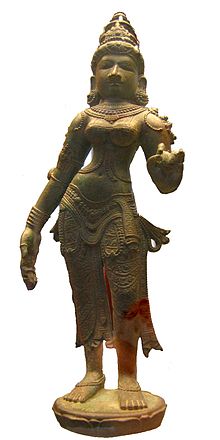Our website is made possible by displaying online advertisements to our visitors.
Please consider supporting us by disabling your ad blocker.
Devi
| Part of a series on |
| Hinduism |
|---|
 |

Devī (/ˈdeɪvi/;[1] Sanskrit: देवी) is the Sanskrit word for 'goddess'; the masculine form is deva. Devi and deva mean 'heavenly, divine, anything of excellence', and are also gender-specific terms for a deity in Hinduism.
The concept and reverence for goddesses appears in the Vedas, which were composed around the 2nd millennium BCE. However, they did not play a vital role in that era.[2] Goddesses such as Durga, Kali, Lakshmi, Parvati, Radha, Saraswati and Sita have continued to be revered in the modern era.[2] The medieval era Puranas witness a major expansion in mythology and literature associated with Devi, with texts such as the Devi Mahatmya, wherein she manifests as the ultimate truth and supreme power. She has inspired the Shaktism tradition of Hinduism. Further, Devi is viewed as central in the Hindu traditions of Shaktism and Shaivism.[2][3]
- ^ "Devi". Oxford English Dictionary (Online ed.). Oxford University Press. doi:10.1093/OED/1262170948. (Subscription or participating institution membership required.)
- ^ a b c Cite error: The named reference
kinsleywas invoked but never defined (see the help page). - ^ Flood, Gavin, ed. (2003), The Blackwell Companion to Hinduism, Blackwell Publishing Ltd., ISBN 1-4051-3251-5, pp. 200–203.
Previous Page Next Page


